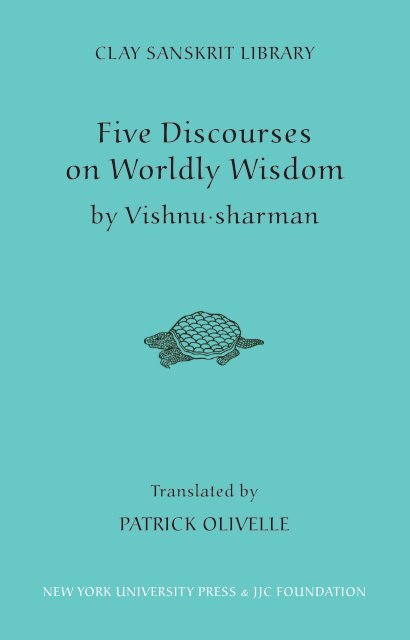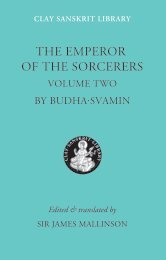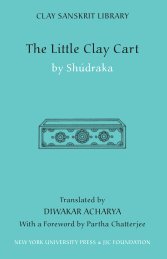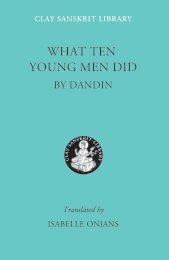Five Discourses on Worldly Wisdom - Clay Sanskrit Library
Five Discourses on Worldly Wisdom - Clay Sanskrit Library
Five Discourses on Worldly Wisdom - Clay Sanskrit Library
Create successful ePaper yourself
Turn your PDF publications into a flip-book with our unique Google optimized e-Paper software.
clay sanskrit library<br />
<str<strong>on</strong>g>Five</str<strong>on</strong>g> <str<strong>on</strong>g>Discourses</str<strong>on</strong>g><br />
<strong>on</strong> <strong>Worldly</strong> <strong>Wisdom</strong><br />
by Vishnu∙sharman<br />
Translated by<br />
PATRICK OLIVELLE<br />
new york universit y press & jjc foundati<strong>on</strong>
THE CLAY SANSKRIT LIBRARY<br />
FOUNDED BY JOHN & JENNIFER CLAY<br />
GENERAL EDITOR<br />
RICHARD GOMBRICH<br />
EDITED BY<br />
ISABELLE ONIANS<br />
SOMADEVA VASUDEVA<br />
WWW.CLAYSANSKRITLIBRARY.COM<br />
WWW.NYUPRESS.ORG
Copyright c○ 2006 by the CSL.<br />
All rights reserved.<br />
First Editi<strong>on</strong> 2006.<br />
The <strong>Clay</strong> <strong>Sanskrit</strong> <strong>Library</strong> is co-published by<br />
New York University Press<br />
and the JJC Foundati<strong>on</strong>.<br />
Further informati<strong>on</strong> about this volume<br />
and the rest of the <strong>Clay</strong> <strong>Sanskrit</strong> <strong>Library</strong><br />
is available <strong>on</strong> the following websites:<br />
www.claysanskritlibrary.com<br />
www.nyupress.org<br />
ISBN-13: 978-0-8147-6208-0<br />
ISBN-10: 0-8147-6208-5<br />
Artwork by Robert Beer.<br />
Typeset in Adobe Garam<strong>on</strong>d at 10.25 : 12.3+ pt.<br />
Printed in Great Britain by St Edmundsbury Press Ltd,<br />
Bury St Edmunds, Suffolk, <strong>on</strong> acid-free paper.<br />
Bound by Hunter & Foulis, Edinburgh, Scotland.
the five discourses<br />
<strong>on</strong> worldly wisdom<br />
by Vis . n . u´sarman<br />
TRANSLATED BY<br />
PATRICK OLIVELLE<br />
NEW YORK UNIVERSITY PRESS<br />
JJC FOUNDATION<br />
2006
C<strong>on</strong>tents<br />
<strong>Sanskrit</strong> alphabetical order 9<br />
CSL c<strong>on</strong>venti<strong>on</strong>s 9<br />
FIVE DISCOURSES ON WORLDLY WISDOM<br />
Introducti<strong>on</strong> 15<br />
The Prelude to the Story 49<br />
Book IOn Causing Dissensi<strong>on</strong> am<strong>on</strong>g Allies 57<br />
Book I On Causing Dissensi<strong>on</strong> am<strong>on</strong>g Allies 57<br />
Story 1 The M<strong>on</strong>key That Pulled the Wedge 66<br />
Story 2 The Jackal That Tried to Eat a Drum 96<br />
Story 3 The Adventures of an Ascetic 106<br />
Story 3.1 The Ascetic and the Rogue 106<br />
Story 3.1.1 Howthe Battling Rams Killed the Greedy<br />
Jackal 108<br />
Story 3.2 AWeaver Cuts the Nose of a Bawd 110<br />
Story 4 Howthe Crows Killed the Snake 122<br />
Story 4.1 The Crab Cuts Off the Her<strong>on</strong>’s Head 124<br />
Story 5 The Hare That Outwitted the Li<strong>on</strong> 132<br />
Story 6 Howthe Louse Got Killed Trying to be Nice<br />
to a Bug 152<br />
Story 7 Howthe Li<strong>on</strong>’s Servants Got the Camel<br />
Killed 178<br />
Story 8 Howthe Sandpiper Defeated the Ocean 192<br />
Story 8.1 The Turtle and the Geese 194
Story 8.2 The Fate of Three Fish: Farsighted,<br />
Quick-witted, and Inevitable 196<br />
Story 9 The Bird That Tried to Advise a M<strong>on</strong>key 218<br />
Story 10 TwoFriends and Betrayed Trust 224<br />
Story 10.1 How the M<strong>on</strong>gooses Ate the Her<strong>on</strong>’s<br />
Chicks 230<br />
Story 11 The Ir<strong>on</strong>-Eating Mice 236<br />
Book II On Securing Allies 251<br />
Story 1 The Ascetic and the Mouse 282<br />
Story 1.1 The Woman Who Traded Sesame<br />
for Sesame 286<br />
Story 1.1.1 Howthe Greedy Jackal Died Eating<br />
aBowstring 288<br />
Story 2 How Chitránga Got Caught in a Trap 334<br />
Book III On War and Peace:<br />
the Crows and the Owls 353<br />
Story 1 The Ass in a Leopard’s Skin 374<br />
Story 2 The Owl is Elected King of Birds 376<br />
Story 2.1 The Hare Bluffs the Elephant 378<br />
Story 2.2 Partridge and Hare Take Their Case to<br />
the Cat 392<br />
Story 3 Howthe Rogues Tricked the Brahmin 404<br />
Story 4 The Old Merchant and His Young Wife 416<br />
Story 5 The Thief, the Ogre, and the Brahmin 418
Story 6 Howthe Unfaithful Wife Tricked Her<br />
Foolish Husband 424<br />
Story 7 The Mouse That Turned into a Girl 430<br />
Story 8 Frogs GoforaRide<strong>on</strong>theBackof<br />
aSnake 448<br />
Book IV On Losing What You Have Gained 473<br />
Story 1 The Ass Without Ears or a Heart 492<br />
Book VOn Hasty Acti<strong>on</strong>s 503<br />
Story 1 Building Castles in the Air 506<br />
Story 2 The Barber Who Killed the M<strong>on</strong>ks 514<br />
Notes 519<br />
Glossary 541<br />
Index 549<br />
A sandhi grid is printed <strong>on</strong> the inside of the back cover 549
Book III<br />
On War and Peace:<br />
The Story of<br />
the Crows and the Owls
ath’ êdam ārabhyate sam. dhi Avigraha Asam. bandham.<br />
kāk’Aôlūkīyam. nāma tr.tīyam. tantram, yasy’ âyam ādyah.<br />
´slokah. :<br />
na vi´svaset pūrvaAvirodhitasya<br />
´satro´s camitratvam upāgatasya;<br />
dagdhām. guhām. pa´syata ghūkaApūrn. ām.<br />
kākaApran. ītena hut’Aâ´sanena. [1]<br />
rājaAkumārā ūcuh. : «katham. c’ âitat?» Vis.n. u´sarm” āha:<br />
asti, kasmim. ´s cid van’Aôdde´se mahān nyagrodhaAvr.ks.ah.<br />
snigdhaAbahalaAparn. aAgulmaAchāyayā svAāgatam iv’ âdhvaA<br />
gānām. prayacchati. tatra Meghavarn. <strong>on</strong>āma vāyasaArājah.<br />
prativasati sma, kākaAsahasraAparivārah. .<br />
3.5 tatra n’ âtiAdūra ulūkaAsahasraAparivārah. Arimardano nām’<br />
ôlūkaArāja´scaprativasati sma. sa c’ âikadā sahaAjaAvair’Aânu´sayād<br />
ulūk’AôpalabdhaAdurgaAvr.tt’Aântah. KālaAbalaA´saktyārātrāv<br />
āgatya, mahat” ôlūkaAsam. ghātena tasy’ ôpari sam. nipatitah. .<br />
mahac ca tes.ām. kākānām. kadanam. kr.tvā, apayātah. .<br />
anye Adyu´s caprabhātaAsamaye hataA´ses.ān bhagnaAcañcuApaks.aAcaran.<br />
ān anyām. ´s casametya, ´sivir’AânusāraApravicay’Aôpalabdhim.<br />
kr.tvā, mantribhih. s’Aârdham. Meghavarn. o<br />
mantrayitum ārabdhah. . «pratyaks.am etan mahad vi´sasanam<br />
asmākam. saApatnena Arimardanena kr.tam. dr.s.t.aAdurgaAmārgo<br />
’sāv ava´syam adya rātrau labdh’Aâvasaro ’smadAaAbhāvāya<br />
354
Webegin here the Third Book, named “The Story<br />
of the Crows and the Owls Illustrating War and<br />
Peace.” This is its opening verse:<br />
In aman you have <strong>on</strong>ce antag<strong>on</strong>ized,<br />
Or in a foe who has become a friend,<br />
you should never place your trust.<br />
See how the hideout filled with owls was burnt,<br />
by the fire carried by crows. [1]<br />
The princes asked: “How did that happen?” Vishnu·sharman<br />
narrated this story.<br />
In a certain forest there was <strong>on</strong>ce a large banyan tree. It<br />
appeared to offer words of warm welcome to travellers with<br />
its cooling shade under its abundant foliage and cluster of<br />
trunks. In that tree lived a king of crows named Megha·varna,<br />
the Cloud-colored, with a retinue of a thousand crows.<br />
Nottoo far from that tree there also lived a king of owls 3.5<br />
named Ari·márdana, the Crusher-of-Foes, with his retinue<br />
of a thousand owls. Ari·márdana had learned all about Megha·varna’s<br />
fortress from his owls. One day, driven by his<br />
inborn enmity towards crows, he came at night with a large<br />
squadr<strong>on</strong> of owls and attacked Megha·varna with a force as<br />
formidable as Death itself. After inflicting a terrible massacre<br />
<strong>on</strong> the crows, he departed.<br />
The next morning Megha·varna assembled the crows that<br />
had escaped the slaughter, many with broken beaks, wings,<br />
and feet, and received a report <strong>on</strong> the c<strong>on</strong>diti<strong>on</strong> of the camp.<br />
Then he opened a meeting of his ministers to obtain their<br />
counsel, telling them: “You see before your very eyes the<br />
massacre inflicted <strong>on</strong> us by our enemy Ari·márdana. Now<br />
355
3.10<br />
five discourses <strong>on</strong> worldly wisdom<br />
punar es.yati. tad aAhīnaAkālam upāya´scintyatām. tadAvighāto<br />
yathā bhavat’ îti.» evam uktvā, ek’AântīAbhūtah. .<br />
atha tasy’ ânvayaAparam. Apar”Aāgatah. pañca sacivās tis.t.ha-<br />
nti. tad yathā: Ud. d. īvī, Sam. d. īvī, Ād. īvī, Prad. īvī, Ciram. jīvīc’<br />
êti. tān pratyekam. pras.t.um ārabdhah. .<br />
tes.ām ādāv Ud. d. īvinam. pr.s.t.avān: «bhadra, evam avasthi-<br />
te, kim anAantaram. karan. īyam. manyase?»<br />
so ’bravīt: «kim. may” âbhyadhikam. kim. cij jñāyate? deva,<br />
yad eva ´sāstre ’bhihitam, tad eva vaks.yāmi. kim. tu balavatā<br />
vigr.hītasya tadAanuprave´so vide´saAgamanam. v” êti.»<br />
tac chrutvā, Sam. d. īvinam āha: «bhadra, bhavān katham.<br />
manyata iti.»<br />
sa āha: «deva, yad ev’ ânen’ âbhihitam: ‹balavatā vigr.hīta-<br />
sya vide´saAgamanam iti,› tan n’ âAkasmād ekaApada eva durgaA<br />
parityāgah. kāryah. . yato yuktam evam. sthite, dolāAvyājena<br />
kālam. yāpayitum. yadā bhayam. bhavis.yati, tad” âpayānam.<br />
karis.yāmah. . yadāsvāsthyam, tadādurga eva sthāsyāma iti.»<br />
356
<strong>on</strong> war and peace: the crows and the owls<br />
that he has discovered the way into our fortress, given the<br />
opportunity, he is sure to return t<strong>on</strong>ight to finish us off.So<br />
without delay we must think of a strategy to thwart him.”<br />
After saying this he withdrew to a secluded spot.<br />
Megha·varna had five ministers who had inherited the<br />
office, succeeding their forefathers. They were: Uddívin,<br />
the High-flyer, Sandívin, the Joint-flyer, Adívin, the Backward-flyer,<br />
Pradívin, the Onward-flyer, and Chirañ·jivin,<br />
the L<strong>on</strong>g-lived. Megha·varna began to questi<strong>on</strong> each of<br />
them in turn.<br />
The first <strong>on</strong>e he questi<strong>on</strong>ed was Uddívin: “What do you<br />
think, my friend? Under these circumstances, what should<br />
we do now?”<br />
Uddívin: “Am I a pers<strong>on</strong> who would know anything<br />
of special value? Your Majesty, I can <strong>on</strong>ly tell you what is<br />
written in the authoritative texts <strong>on</strong> the subject. When a<br />
pers<strong>on</strong> is attacked by some<strong>on</strong>e str<strong>on</strong>ger, he has <strong>on</strong>ly two<br />
opti<strong>on</strong>s. He can either surrender to the other or go into<br />
exile.”<br />
After listening to him, Megha·varna asked Sandívin: “And 3.10<br />
you, my friend, what do you think?”<br />
Sandívin: “This fellow’s advice, Your Majesty, is that<br />
when a pers<strong>on</strong> is attacked by some<strong>on</strong>e str<strong>on</strong>ger, he should<br />
go into exile. My resp<strong>on</strong>se is that <strong>on</strong>e should not aband<strong>on</strong><br />
<strong>on</strong>e’s fortress suddenly and without cause. The proper<br />
thing to do under the current circumstances is to bide our<br />
time following an <strong>on</strong>-again-off-again strategy. When danger<br />
threatens, we will flee. But so l<strong>on</strong>g as things are normal,<br />
we will remain right here in the fortress.”<br />
357
five discourses <strong>on</strong> worldly wisdom<br />
tatas tasy’ âpi vacanam avadhārya, Prād. īvinam. pr.s.t.avān:<br />
«bhavato ’tra ko ’bhiprāyah. ?»<br />
so ’bravīt: «rājan, ātyayikam idam anAavaratam. gat’AāgataAkaran.<br />
am. dīn’AândhaAkubjaAvāmanaAkun. iAkhañjaAvyādhit’A<br />
ôpaskar’Aādibhir nayan’Aānayanair eva vayam. vinas.t.āh. . yata<br />
evam. gate, sam. dhir eva ´sreyasAkara iti. yat kāran. am:<br />
pravr.ddhaAcakren. ’ ākrānto<br />
rājñā balavat” âAbalah.<br />
sam. dhino ’pakramet tūrn. am.<br />
ko´saAdan. d. ’AātmaAbhūtaye. [2]<br />
3.15 yatas tes.ām. sam. natim. kr.tvā, sukham anudvignā ih’âiva<br />
sthāsyāma iti.»<br />
tasy’ âpi vacanam avadhārya, Ād. īvinam. pr.s.t.avān: «bhadra,<br />
evam avasthite, asmākam. kim. prāptaAkālam. manyase?»<br />
sa āha: «varam aran. ye harin. a Aromantha Akas.āyān. y ambhām.<br />
sy āsevitāni, na ca prabhutvaAras’Aāsvādinah. par’Aôpasthāne<br />
kr.pan. aAjīvitam iti. api ca:<br />
358<br />
jyāyān na named aAsame;<br />
’Asam’Aôpanamanam. mahat kas.t.am.<br />
garhitam etat pum. sām<br />
atiAnamanam. sāhasaAdhanānām. [3]
<strong>on</strong> war and peace: the crows and the owls<br />
Megha·varna listened to him and then asked Pradívin:<br />
“What is your view <strong>on</strong> the matter?”<br />
Pradívin: “To be c<strong>on</strong>stantly going back and forth, Your<br />
Highness, would be suicidal. We will all be destroyed if<br />
we have to carry back and forth everything—the weak, the<br />
blind, the cripples, the dwarfs, the maimed, the lame, the<br />
sick, and all our bel<strong>on</strong>gings. So, under the circumstances,<br />
the best thing to do is to sue for peace. And the reas<strong>on</strong> is<br />
this:<br />
When a str<strong>on</strong>g king attacks with powerful troops,<br />
The weaker king should promptly sue for peace,<br />
To save his assets, army, and himself. [2]<br />
So, weshould make peace with them and c<strong>on</strong>tinue to 3.15<br />
live right here in comfort and free from anxiety.”<br />
Megha·varna listened to his advice also and then asked<br />
Adívin: “And you, my friend, what do you think is the<br />
appropriate thing for us to do under these circumstances?”<br />
Adívin: “For those who have tasted the sweet flavor of<br />
sovereignty, it is far better to live in the wilderness drinking<br />
water dirtied by the cud the deer chew than to lead a<br />
wretched life in the service of an enemy. Furthermore,<br />
A superior should never bow to <strong>on</strong>e<br />
who is not his peer;<br />
To bow to people who are not <strong>on</strong>e’s peers<br />
is a great disgrace.<br />
To yield so readily is unworthy<br />
Of real men, for whom valor is wealth. [3]<br />
359
3.20<br />
api ca:<br />
five discourses <strong>on</strong> worldly wisdom<br />
dan. d. ānām iva namatām. ,<br />
pum. sām. chāyā vivr.ddhim upayāti.<br />
ks.ayam eti c’ âtiAnamatām.<br />
tasmāt pran. amen na c’ âtiAnamet. [4]<br />
tai´s casah’ âsmākam. sam. dar´sanam eva na vidyate. sam. -<br />
dar´sanena vinā katham. sam. dhir bhavis.yati? tat sarvathā yu-<br />
ddham eva nas taih. saha pus.kalam iti.»<br />
tato Meghavarn. as tes.ām. caturn. ām api pr.thak pr.thag<br />
abhiprāyam. jñātvā, Ciram. Ajīvinam āha: «tāta, tvam asmākam.<br />
cirantano ’nvay’Aāgatah. sacivah. . ajasram. ca hit’Aânves.ī.<br />
kim evam avasthite ’pi, adhunāprāptaAkālam. manyase? yac<br />
ca tvam. brūs.e, tad eva nah. ´sreyasAkaram iti.»<br />
evam ukte, Ciram. jīvy āha: «deva, kim ebhir n’ ôktam asti,<br />
yatra mama vacan’Aâvakā´sah. syāt? iha hi sam. dhiAvigrahayoh.<br />
sam. dhir vā vigraho vā taupūrv’Aôktāv eva. tath” âpi yad<br />
Ād. ivin” âbhihitam, tat paks.aAvyāvartanāy’ ôcyate. bhadra,<br />
katham es.ām asmākam. ca yuddham. sāmānyam? tāvad aAsā-<br />
dhāran. am. yuddham asmākam. sarvathātebalavantah. . tatas<br />
taih saha na yuddham asmākam ucitam. tathā ca:<br />
360
<strong>on</strong> war and peace: the crows and the owls<br />
And again,<br />
A man’s shadow will lengthen when he bows, 3.20<br />
as a stick’s when it’s bent.<br />
But itdisappears if you bend too much;<br />
So you should bow, but never bow too much. [4]<br />
There is no comm<strong>on</strong> interest at all between the owls<br />
and us, and without such a comm<strong>on</strong> interest, how can we<br />
negotiate a peace? C<strong>on</strong>sidering everything, therefore, war is<br />
the best opti<strong>on</strong> for us.”<br />
Megha·varna, after taking stock of the views of all four of<br />
them <strong>on</strong>e by <strong>on</strong>e, then said to Chirañ·jivin: “Father, you are<br />
our most senior hereditary minister, and you always have<br />
our welfare at heart. Under the current circumstances what<br />
do you think is the appropriate thing for us to do at this<br />
point? Whatever you say will clearly be the best course for<br />
us.”<br />
So petiti<strong>on</strong>ed, Chirañ·jivin replied: “What is there for me<br />
to say, Your Majesty? Haven’t they already said everything?<br />
Between the alternatives of war and peace, we have already<br />
heard arguments in favor of pursuing the <strong>on</strong>e and the other<br />
in the current circumstances. The advice of Adívin, however,<br />
would lead to the complete rout of our side. How, my friend,<br />
can there ever be an equal fight between us and the owls?<br />
Clearly, in any fight our side will come up short. They are<br />
more powerful in every way. So it will be unwise of us to<br />
start a war with them. As it is said:<br />
361
3.25<br />
five discourses <strong>on</strong> worldly wisdom<br />
pares.ām ātmana´s c’âiva<br />
yo ’Avicārya bal’AâAbalam<br />
kāryāy’ ôttis.t.hate mohād,<br />
vyāpadah. sa samīhate. [5]<br />
laghus.v api vidhātavyam.<br />
gauravam. paripanthis.u,<br />
kr.tyAantaraAvidhāt¯r.n. ām.<br />
bhavanti hy aAphalāh. kriyāh. .[6]<br />
362<br />
ks.amāvantam arim. prājñam.<br />
kāle vikramaAsevinam<br />
par’AātmaAgun. aAdos.aAjñam<br />
anusmr.tya na vi´svaset. [7]<br />
yam ev’ âbhyupayāti ´Srīr<br />
upāyaAparitos.itā,<br />
nirAudvignā hitatr’āste,<br />
na karaAgrahaAdūs.itā. [8]<br />
´sātayaty eva tejām. si<br />
dūraAstho ’py unnato ripuh. ;<br />
s’Aāyudho ’pi nikr.s.t.’Aātmā<br />
kim āsannah. karis.yati? [9]
<strong>on</strong> war and peace: the crows and the owls<br />
When, without weighing the relative strengths<br />
And weaknesses of yourself and your foes,<br />
Yougorushing rashly into acti<strong>on</strong>,<br />
you’re courting disaster! [5]<br />
Show great respect even to minor foes; 3.25<br />
if you act otherwise,<br />
your efforts are in vain. [6]<br />
An enemy who is patient and wise,<br />
Who resorts to force at the proper time,<br />
Knows his and his foe’s strengths and weaknesses—<br />
Be watchful, never place your trust in him. [7]<br />
When Fortune betakes herself to a man,<br />
Pleased by the sound policies he pursues,<br />
She will remain with that man, undisturbed;<br />
Her marriage to him will bring her no shame.* [8]<br />
Even from afar, an exalted foe<br />
Is sure to eclipse a man’s majesty.<br />
Even though he is near and fully armed,<br />
what can a petty man do? [9]<br />
363
3.30<br />
five discourses <strong>on</strong> worldly wisdom<br />
na bhīto, na parāmr.s.t.o,<br />
n’ âpayāto, na varjitah. ,<br />
n’ âA´sastro ’py avamantavyo,<br />
n’ âiko v” êti nay’Aâdhikaih. .[10]<br />
yasya sidhyaty aAyatnena<br />
´satruh. ,savijayī narah. ;<br />
ya ekataratām. gatvā<br />
jayī, vijita eva sah. .[11]<br />
siddhim. vañcanayāvetti,<br />
parasAparaAvadhena vā.<br />
nirAupāyam. sukham. sv’Aântam. .<br />
dvayoh. kim? iti cintyatām! [12]<br />
mad’Aâvaliptaih. ,pi´sunair,<br />
lubdhaih. ,kām’Aāta˙nkaih. , ´sat.haih.<br />
darp’Aôddhataih. ,krodhaAparair<br />
dan. d. aAnītih. suAdurAgrahā. [13]<br />
iyam. tv aAbhinnaAmaryādaih. ,<br />
svAanu´sis.t.aih. ,kr.t’Aātmabhih. ,<br />
sarvam. Asahair, upāyaAjñair,<br />
aAmūd. hair eva dhāryate. [14]<br />
tat sarvathā yuddham eva na ´sreyasAkaram iti. kasmāt?<br />
jyāyasā virodho hastinā pādaAyuddham iv’ âik’AântaAvinā´sāya.»<br />
364
<strong>on</strong> war and peace: the crows and the owls<br />
Whether he’s frightened or is beaten up,<br />
Whether he’s in flight or is aband<strong>on</strong>ed,<br />
Whether he’s unarmed or is all al<strong>on</strong>e,<br />
Youshould never humiliate a man;<br />
So state the experts in sound policy. [10]<br />
When his enemy yields without a fight, 3.30<br />
he’s a victor indeed.<br />
Winning after an uncertain battle,<br />
is truly a defeat. [11]<br />
There are two ways <strong>on</strong>e can achieve success:<br />
mutual slaughter or guile.<br />
Prosperity without sound policy<br />
brings about <strong>on</strong>e’s own death.<br />
C<strong>on</strong>sider which of the two you should choose. [12]<br />
People who are haughty and malicious,<br />
Who are greedy, deceitful, full of lust,<br />
Who are pr<strong>on</strong>e to anger, puffed up with pride—<br />
Such people find it difficult to grasp<br />
the proper way to rule. [13]<br />
It can be grasped, but <strong>on</strong>ly by those men<br />
Who stay within bounds and have been taught well,<br />
Well-disciplined, whose patience knows no bounds,<br />
Who are skilled in policy and are wise. [14]<br />
So,itisabsolutely clear that war is not to our advantage.<br />
And the reas<strong>on</strong> is simple. Picking a fight with some<strong>on</strong>e<br />
str<strong>on</strong>ger is like a foot-soldier fighting with an elephant—<br />
you are sure to end up dead.”<br />
365
3.35<br />
3.40<br />
five discourses <strong>on</strong> worldly wisdom<br />
Meghavarn. a āha: «tāta, kathaya! kim. nis.pannam?»<br />
so ’bravīt: «bhadra, sam. pradhāryatām etat. uktam. ca:<br />
yā hiprān. aAparityāgaA<br />
mūlyen’ âpi na labhyate,<br />
sā ´Srīr mantraAvidām. ve´smany<br />
anAāhut” âpi dhāvati. [15]<br />
kramen. a yah. ´sāstraAvido<br />
hit’Aâis.in. ah.<br />
kriyāAvibhāge suAhr.do<br />
na pr.cchati.<br />
[16]<br />
de´sam. balam. kāryam upāyam āyuh.<br />
sam. cintya yah. prārabhate svaAkr.tyam,<br />
mah”Aôdadhim. nadya iv’ âbhipūrn. am.<br />
tam. sam. padah. satApurus.am. bhajante. [17]<br />
´sūrāh. , sarv’AôpadhāA´suddhā,<br />
buddhimanto, vicaks.an. āh.<br />
sahāyāh. syur; nr. Apatvam. hi<br />
satAsahāyaAnibandhanam. [18]<br />
366<br />
vis.ān. aAsam. ghat.t.aAsamutthit’AânalaA<br />
sphuli˙ngaAmāl”Aākulite ’pi dantinām<br />
ran. e ’pi pītvā tuya´sām. si vidvis.ām. ,<br />
bhavaty aAvidvān na hi bhājanam. ´sriyah. .[19]
<strong>on</strong> war and peace: the crows and the owls<br />
Megha·varna: “Tell me, father. What will be the out- 3.35<br />
come?”<br />
Chirañ·jivin: “Think about this, my friend. It is said:<br />
Even at the price of losing <strong>on</strong>e’s life,<br />
Fortune cannot be w<strong>on</strong>;<br />
Yetifyou have strategic acumen,<br />
Uninvited she will run to your house. [15]<br />
Not methodically seeking advice<br />
regarding your pursuits,<br />
From well-read friends of yours who wish you well,<br />
. [16]*<br />
‘What is this place like? What are my forces?<br />
What’s to be d<strong>on</strong>e? What’s the right strategy?<br />
what’s the state of my life?’<br />
When he embarks <strong>on</strong> a course of acti<strong>on</strong>,<br />
after weighing these points,<br />
Good Fortunes chase after that sterling man<br />
Like rivers, the ocean filled to the brim.* [17]<br />
Assistants should be brave, prudent, and wise, 3.40<br />
of proven loyalty;<br />
For, without the help of good assistants,<br />
no king can ever rule. [18]<br />
Though he has drunk the glory of his foes,<br />
In battles garlanded by fiery sparks,<br />
Flying from the striking of elephant tusks,<br />
Fortune visits not an ignorant man. [19]<br />
367
3.45<br />
five discourses <strong>on</strong> worldly wisdom<br />
tat sarvathā gun. avatAsahāyaAparigraho vijigīs.ūn. ām ek’AântaAsiddhaye.<br />
uktam. ca:<br />
na vam. ´saAmārgaAkramaAlaks.an. am. gun. am. ,<br />
nirīks.ate n’ âiva vapur, na c’ āgamam;<br />
ya eva ´sūrah. suAsahāyavān naras,<br />
tam eva Laks.mī´s capal” âpi sevate. [20]<br />
gun. es.v ādhāraAbhūtes.u<br />
phale kasy’ âsti sam. ´sayah. ?<br />
nyasta´s c’ātmā satām. vr.tte<br />
vibhūti´s canadurAlabhā. [21]<br />
‹api kīrtyAartham āyānti<br />
nā´sam. sadyo ’tiAmāninah. ?<br />
na c’ êcchanty aAya´soAmi´sram<br />
apy ev’ ānAantyam āyus.ah. .› [22]<br />
368<br />
‹jayāy’ ôtks.ipyatām. pādo<br />
daks.in. ah. kim. vicāryate?<br />
mūlam. hi prāhur ācāryā<br />
dīrghaAsūtratvam āpadām.› [23]<br />
´srut’Aâpaviddhair etair vā<br />
vr.thā kim. ´sukaAbhās.itaih. ?<br />
prājñas tvam. , tyajyatām. maunam. ;<br />
yasya velā, tad ucyatām! [24]
<strong>on</strong> war and peace: the crows and the owls<br />
To ensure complete success, a man intent <strong>on</strong> c<strong>on</strong>quest<br />
must always surround himself with excellent assistants. For<br />
it is said:<br />
Fortune, fickle though she is, regards not<br />
Fine ancestry, great learning, or good looks,<br />
as marks of excellence;<br />
She waits <strong>on</strong>ly <strong>on</strong> a man who is brave,<br />
and has good attendants. [20]<br />
When a man is anchored<br />
On the principles of sound policy,*<br />
Is there any doubt that he will succeed?<br />
And when he follows the path of good men,<br />
Prosperity is not hard to obtain. [21]<br />
‘Do not proud men lay down their lives forthwith 3.45<br />
for the sake of fame?<br />
They yearn not even for unending life<br />
mixed with infamy.’ [22]<br />
‘Step forth with your right foot for victory;<br />
why do you still hesitate?<br />
Procrastinati<strong>on</strong>, the teachers declare,<br />
is the root of misfortune!’ [23]<br />
Parrots’ prattle! Forget all such dribble,<br />
dismissed by learned men!<br />
Youare wise. D<strong>on</strong>’t be silent any more.<br />
When the time has come, tell what must be d<strong>on</strong>e. [24]<br />
369
3.50<br />
five discourses <strong>on</strong> worldly wisdom<br />
‹mantraAmūlam. hi vijayam. ›<br />
pravadanti manīs.in. ah. ;<br />
mantrasya punar ātmāca<br />
buddhi´s c’āyatanam. param. [25]<br />
s.ad. eva khalu mantrasya<br />
dvārān. itunar’Aâdhipa;<br />
viditāny eva te, tāta,<br />
kīrtayis.yāmi kīrtiman: [26]<br />
ātmānam. , mantriAdūtam. ca,<br />
channam. ,triAs.avan. aAkramam,<br />
ākāram. bruvate s.as.t.ham;<br />
etāvān mantraAni´scayah. .[27]<br />
aAsam. gr.hītasya punar<br />
mantrasya ´sr.n. u yat phalam:<br />
aAhīnam. dharmaAkāmābhyām<br />
artham. prāpnoti kevalam. [28]<br />
atha vyavasit’Aânujñā,<br />
chedanam. sam. ´sayasya ca,<br />
aAni´sam. tasya ca jñānam. —<br />
mantrin. ām. triAvidham. phalam. [29]<br />
tad yathā yomantro visrambhan. am. gacchati, tathā prayatitavyam.<br />
yat kāran. am:<br />
370
<strong>on</strong> war and peace: the crows and the owls<br />
For counsel is the root of victory,<br />
so have wise men declared.<br />
But the highest abode of good counsel<br />
is <strong>on</strong>eself and <strong>on</strong>e’s mind! [25]<br />
There are just six ways, we all know, O King,<br />
In which, Glorious King, counsel is betrayed.<br />
Although, s<strong>on</strong>, you already know them all,<br />
I will menti<strong>on</strong> them now. [26]<br />
Oneself, <strong>on</strong>e’s ministers and messengers, 3.50<br />
Secret agents and the three daily baths,<br />
The sixth, they say, is facial expressi<strong>on</strong>s.<br />
That’s the verdict regarding good counsel. [27]<br />
But look at the rewards that counsel brings,<br />
when it is not divulged:<br />
One gains singular success in this world,<br />
Without damage to pleasure or virtue.* [28]<br />
Three are the benefits ministers bring:<br />
They sancti<strong>on</strong> decisi<strong>on</strong>s and remove doubts,<br />
Then there’s wisdom, which he can always tap. [29]<br />
Oneshould always strive to keep the counsel <strong>on</strong>e receives<br />
c<strong>on</strong>fidential. And this is the reas<strong>on</strong>:<br />
371
3.55<br />
five discourses <strong>on</strong> worldly wisdom<br />
mithyā pran. ihito mantrah.<br />
prayoktāram aAsam. ´sayam<br />
durAis.t.a ivavetālo<br />
n’ âAnihaty’ ôpa´sāmyati. [30]<br />
ātmaApaks.aAks.ayāy’ âiva<br />
paraApaks.’Aôdayāya ca<br />
mantraAdvaidham amātyānām.<br />
tan na syād iha bhūtaye. [31]<br />
āyaAvyayau yasya ca sam. vibhaktau,<br />
channa´s cacāro, nibhr.ta´s camantrah. ,<br />
na c’ âApriyam. mantris.uyobravīti -<br />
sa sāgar’Aântām. pr.thivīm. pra´sāsti. [32]<br />
tad evam. punar bravīmi: ‹yuddham. na ´sreya iti.› sam. -<br />
dhir apy aA´sakyo ’rthah. sahaAjaAvair’Aânubandhānām. tad<br />
yadi may” âva´syam. mantrayitavam, tad apanīyatām ete mantriAmātraAvyapade´saAkeval’Aôpajīvinah.<br />
kathāAku´salāh. .naca<br />
karan. īyes.v ātyayikes.u s.at. Akarn. am. rahasyam. phalavad bhavati.»<br />
tathā c’ânus.t.hite, Meghavarn. a āha: «tāta, bālaAbhāvād<br />
anAabhijño ’smi. yathā bravīs.i, tathā karomi. tvadAāyattam.<br />
hi sarvam idam. tvam adhun” ârthaAvādījñānaAvijñānaAsam. -<br />
pannah. pitr. Akramen. ahit’Aâis.ī. kim. tu kautūhalam ucyatām:<br />
katham. punar asmākam ulūkaih. saha vairam utpannam?<br />
iti.»<br />
372
<strong>on</strong> war and peace: the crows and the owls<br />
Counsel wr<strong>on</strong>gly applied, like a vampire*<br />
improperly invoked,<br />
Is not pacified until it has killed<br />
the man who employs it. [30]<br />
When ministers give c<strong>on</strong>flicting advice, 3.55<br />
It can <strong>on</strong>ly lead to his side’s defeat,<br />
And to the triumph of his enemies,<br />
never to his success. [31]<br />
When <strong>on</strong>e matches <strong>on</strong>e’s income and outlay,<br />
Agents are secret, and counsel c<strong>on</strong>cealed,<br />
Says no unkind word to <strong>on</strong>e’s ministers;<br />
One will rule the whole earth up to the sea. [32]<br />
So, Itell you <strong>on</strong>ce more: war is not to our advantage.<br />
Peace, <strong>on</strong> the other hand, is also an impossible goal for<br />
those who have a natural enmity towards each other. If<br />
you insist that I give you my advice, then send away these<br />
people; they are here to gain a livelihood by their title as<br />
‘Minister’ and are <strong>on</strong>ly good at talking. When there are<br />
emergency measures to be taken, secrets heard by six ears<br />
will be ineffective.”<br />
When this request had been carried out, Megha·varna<br />
said to Chirañ·jivin: “Father, I am young and inexperienced.<br />
I will do as you advise; our entire life depends <strong>on</strong> you. You are<br />
the <strong>on</strong>e who will tell us the truth; you have the knowledge<br />
and the wisdom; and you have my welfare at heart, for you<br />
have served my father before me. But I am curious about<br />
<strong>on</strong>e thing. Tell me, how did this enmity between us and the<br />
owls come about?”<br />
373
3.60<br />
five discourses <strong>on</strong> worldly wisdom<br />
so ’bravīt: «bhadra, vāgAdos.āt.<br />
suAciram. hi caran nityam.<br />
grīs.me sasyam aAbuddhimān<br />
dvīpiAcarmaApratichanno<br />
vāgAdos.ād rāsabho hatah. .» [33]<br />
so’ bravīt: «katham. c’ âitat?»<br />
Ciram. jīvy āha:
the ass in a leopard’s skin<br />
Chirañ·jivin: “It all started because of a stupid comment!<br />
L<strong>on</strong>g did he graze n<strong>on</strong>stop in the corn fields; 3.60<br />
Many a summer day he spent grazing<br />
The fields of corn wearing a leopard’s skin;<br />
But due to a stupid comment he made,<br />
the foolish ass was killed.” [33]<br />
Megha·varna asked: “How did that happen?”<br />
Chirañ·jivin narrated this story:
clay sanskrit library<br />
www.claysanskritlibrary.com<br />
the five discourses <strong>on</strong> worldly wisdom is the most<br />
famous collecti<strong>on</strong> of animal fables from India. No other<br />
Indian work has had a greater influence <strong>on</strong> world<br />
literature, and no other collecti<strong>on</strong> of stories has become<br />
as popular in India itself.<br />
new york university press<br />
Washingt<strong>on</strong> Square<br />
New York, NY 10003<br />
www.nyupress.org









